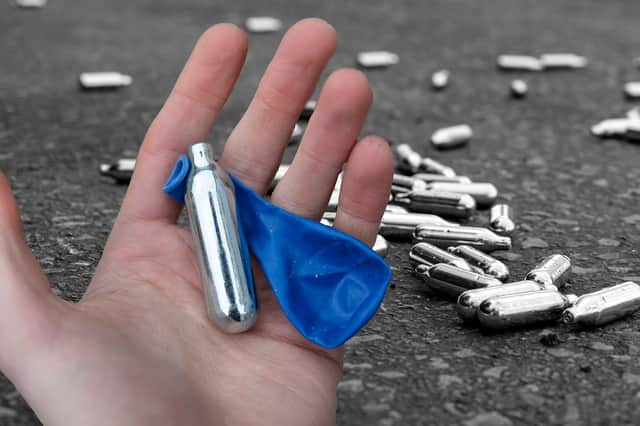Laughing gas ban: experts ‘deeply concerned’ about plans to crack down on Nitrous Oxide


Experts and campaigners have hit out at the government for pushing ahead with plans to criminalise users of Nitrous Oxide, also known as laughing gas.
A campaign group made up of law enforcement members has said the decision will do more harm than good, creating a lucrative black market for criminal gangs and increasing harms for users.
Advertisement
Hide AdAdvertisement
Hide AdThe government has announced plans to designate Nitrous Oxide as a Class C drug, despite advice from the Independent Advisory Council on the Misuse of Drugs, which recommended against the move.
Labour has suggested it supports the move, with shadow culture secretary Lucy Powell saying the party wants to see laughing gas banned because it causes “littering, disruption and anti-social behaviour challenges”.
Government ignored expert panel’s recommendation
Announcing the laughing gas ban, Levelling Up Secretary Michael Gove told Sky News’ Sophy Ridge On Sunday (25 March) programme: “I think any of us who have had the opportunity to walk through our parks in our major cities will have seen these little canisters, these silver canisters which are examples of people not only despoiling public spaces but also people taking a drug which can have a psychological and neurological affect and one that contributes to anti-social behaviour overall.”
The plans have been widely criticised by harm-reduction campaign groups and experts, including the Advisory Council on the Misuse of Drugs, which was asked to review the evidence around harms associated with the drug.
Advertisement
Hide AdAdvertisement
Hide AdThe independent body, which is tasked with providing expert advice on drug policy to the government, produced a report recommending that Nitrous Oxide should not be made illegal under the Misuse of Drugs Act 1971.
It noted that, as a psychoactive substance, Nitrous Oxide is currently controlled under the Psychoactive Substances Act 2016 and that “the number of deaths and demand for treatment for problematic nitrous oxide use remain low compared to many other psychoactive drugs”.
It wrote: “Current evidence suggests that the health and social harms are not commensurate with control under the Misuse of Drugs Act 1971,” and that “the offences under the Misuse of Drugs Act 1971 would be disproportionate for the level of harm associated with nitrous oxide and could have significant unintended consequences”.
The government responded to the review, noting the council’s advice, but saying it would go ahead with plans to bring Nitrous Oxide under the Misuse of Drugs Act, due to “the reported recent rise in health and social harms, and the widespread use and availability of the drug particularly amongst children and young people”.
Advertisement
Hide AdAdvertisement
Hide AdLabour also backs a ban
LEAP UK, an anti-prohibition campaign group made up of law enforcement members with firsthand experience of drug policing, said it is “deeply concerned” by the government’s announcement, and criticised both major parties for prioritising “looking tough on crime,” rather than an evidence-based approach.
In a statement, they said: “The Misuse of Drugs Act is an outdated piece of legislation which has become a political football. We have to take a step back from the outdated approach of “looking tough on crime”. In practice as with any ban and criminal sanction on drug possession, we will create a lucrative black market which creates an opportunity for organised crime groups.
“We will also see more young people criminalised for possessing substances which have a lower harm rate than ‘legal’ drugs such as alcohol. We will see an increase of potential harms to consumers and their health owing to fear of being caught in possession. Prohibiting a drug does not make individuals or society safer -the opposite is true.
“A drug possession charge will hinder job and education prospects. We have many politicians on record admitting to their own drug use, but policy makers are making sure that other people will not be as lucky as they were… not only does the criminalisation of drug possession come with obvious criminal sanctions but this also comes with a loss of future opportunities which impacts both the individual and society as a whole.”
Advertisement
Hide AdAdvertisement
Hide AdLabour’s shadow culture secretary Lucy Powell was asked about the policy on Sky News and said her party would also like to see Nitrous Oxide banned.
She said: “I think it does cause huge amounts of littering, disruption and anti-social behaviour challenges as well.
“We do need to tackle at source these kinds of crimes, sometimes they’re not crimes, but these kinds of behaviours, that are blights on our communities.”
Josh Torrance, a criminologist studying drugs policing at Bristol University, speculated that while the policy may reduce use of the drug, it could potentially lead to production of the drug, which comes in pressurised metal canisters, “moving underground”.
Advertisement
Hide AdAdvertisement
Hide AdMegan Jones, director of harm reduction campaign group Cranstoun, said she was disappointed by comments around drug policy from both major parties.
She said: “Drug policy in the UK seems to be one of the only areas where experts and evidence are ignored. We’re concerned that this move will increase harm, criminalise young people and increase policing demand.”
Asked about the decision to go against the advice of the ACMD on laughing gas, the Prime Minister’s official spokesman said: “We think that not only are drugs a scourge on society, they have a wider societal impact.
“The use of nitrous oxide in these circumstances can ruin a neighbourhood, can make people feel unsafe and that is why the Prime Minister thinks it is right to take these steps.
Advertisement
Hide AdAdvertisement
Hide Ad“Nitrous oxide, on an individual level, is now the third most used drug amongst young people. It has psychoactive effects, the ACMD themselves reported links between it and drug driving, littering and neurological harms.”
